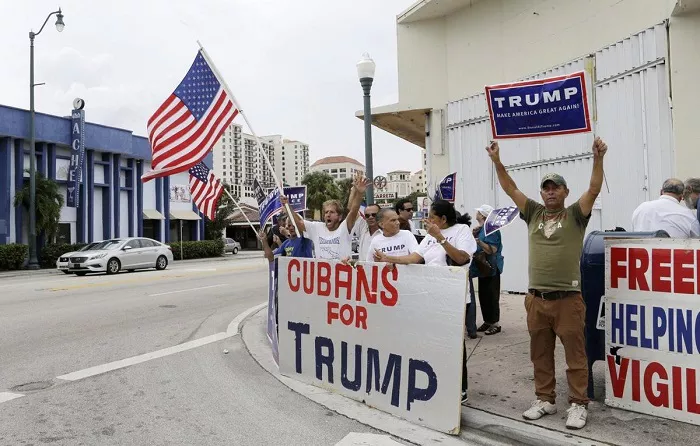Miami, FL — The recent immigration enforcement actions under President Donald Trump’s administration have sent ripples through South Florida’s Cuban exile community, a group historically protected from deportation but now increasingly vulnerable.
Tomás Hernández, 71, a former senior official in Cuba’s foreign intelligence service, was detained by federal agents outside his Miami-area home in March. Authorities allege Hernández concealed his affiliations with Cuba’s Communist Party when applying for permanent residency in the U.S.
The arrests of Hernández and other ex-Cuban officials have been widely supported by Miami’s politically influential Cuban-American community, known for its hardline stance against Havana. “It’s a political gift to Cuban-American hardliners,” said Eduardo Gamarra, a Latin American studies expert at Florida International University. Yet, he added, many within the community fear they could be next, with some perceiving the crackdown as a betrayal.
A Shock to a Privileged Community
While Trump’s broader promise of mass deportations has alarmed migrant groups nationwide, Cuban-Americans—numbering around 2.4 million—have traditionally enjoyed preferential treatment in U.S. immigration law. Thanks to Cold War-era policies aimed at Fidel Castro’s regime, Cuban migrants often received near-automatic refugee status and could secure green cards within a year—unlike migrants from most other countries.
In March, amid a surge of arrivals from Cuba, the Trump administration ended temporary humanitarian parole for roughly 300,000 Cubans, resulting in many detentions and deportation proceedings.
Among those facing removal is Cuban rapper Eliéxer Márquez, known as El Funky, whose pro-Trump anthem “Patria y Vida” became a rallying cry against communism in Cuba. Márquez recently received a notice requiring him to leave the U.S. within 30 days.
Despite Trump’s tough rhetoric on migrants from Venezuela and Haiti, Cuban-Americans have largely avoided direct mention—fostering hope among many that their community would remain exempt from the harsher immigration measures.
Political Backlash and Calls for Action
Democratic activists have leveraged the immigration crackdown to criticize prominent Cuban-American Republican lawmakers, including Senator Marco Rubio and Representatives Mario Díaz-Balart, María Elvira Salazar, and Carlos Giménez. In April, billboards labeling these politicians “traitors” were erected along Miami highways, accusing them of failing to shield migrants from Trump’s policies.
Giménez has taken a proactive stance by sending Homeland Security Secretary Kristi Noem a list of 108 alleged former Cuban state agents or Communist Party officials residing unlawfully in the U.S. In his letter, Giménez emphasized the urgency of enforcing immigration laws to protect national security and uphold the integrity of the immigration system.
A Network Targeting Cuban Officials
Luis Dominguez, a Cuban exile and anti-Castro activist, compiled Giménez’s list. Since fleeing Cuba in 1971, Dominguez has dedicated himself to exposing Cuban government operatives abroad. Using social media and a network of informants, he has identified over 1,200 alleged state agents worldwide, including around 150 in the U.S., via his website Represores Cubanos (“Cuban Repressors”).
Dominguez describes these individuals as living a “double life,” condemning American values while pursuing the “American dream.” He regularly shares his findings with federal law enforcement, though officials have declined to comment on any collaboration.
The Spy Connection
Enrique Garcia, a former colleague of Hernández, recalled their training together in the Soviet Union during the 1970s before Hernández joined the Cuban intelligence agency’s elite “North America” division. Garcia, who defected to the U.S. in the 1990s, has worked to assist American agencies in identifying Cuban spies embedded in migration flows.
“It’s impossible to be on both sides at once,” Garcia said, underscoring concerns over the presence of Cuban agents hiding their past in the U.S.
Though it is unclear when Hernández entered the country, U.S. immigration laws prohibit membership in Communist parties and penalize dishonesty on residency applications.
Deportation Challenges
Despite efforts to remove those no longer welcome, deporting Cubans poses logistical hurdles. The Trump administration continues to operate only one monthly deportation flight to Cuba, each carrying about 60 people. At this pace, it would take nearly 700 years to repatriate the estimated 500,000 Cubans who arrived during the Biden administration without protected status.
Community Reactions
At Versailles Restaurant, a hub of Miami’s Little Havana and a frequent campaign stop for Trump, many elderly Cuban exiles support the president’s crackdown. Rafael Nieto, 83, proudly sported a large Trump 2024 hat
Related topics:
- Indians Lead UK Emigration and Immigration Trends, New Data Reveals
- UK Government’s Immigration Plans Clash with Universities Over International Students
- Korea and Japan to Launch Exclusive Immigration Checkpoints in June


